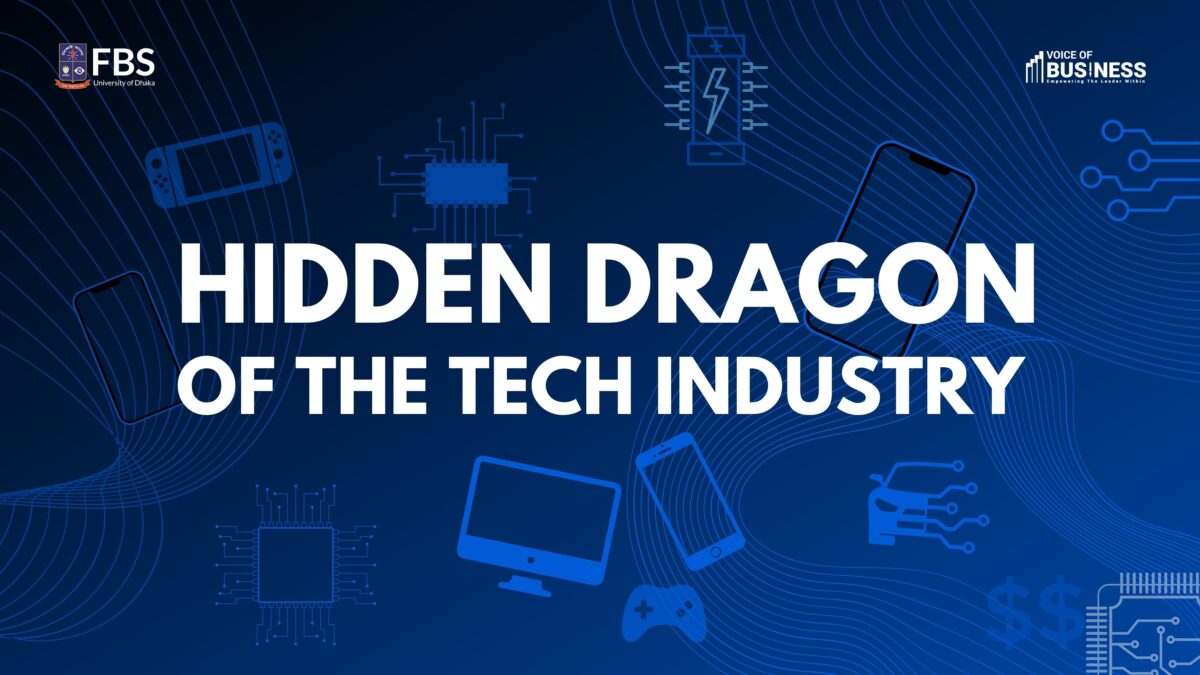Foxconn: The hidden tech monster

VoB Bulletin 2nd Issue
August 6, 2022
Neobanking: A Fresh Way of Banking
October 1, 2022Foxconn: The hidden tech monster
Unsurprisingly for the average consumer, the name Foxconn would not ring any bell although it is highly likely that this company has been a crucial part of their lives all along. Foxconn, a Taiwanese multinational electronics contract manufacturer, is the largest electronics producer worldwide that reportedly produces about 40 percent of the total consumer electronics sold globally.
Foxconn is often referred to as the hidden dragon of the tech industry. It specializes in the development of computer, communications, and consumer electronics products. Foxconn is a company that manufactures electronics for several well-known American, Chinese, Canadian, and Japanese corporations. Recently it has expanded into the electric vehicle, digital health, and robotics industry.
What are its products you may be using right now?
Even the casing of your phone might be the product of Foxconn. It is one of the giant tech companies because it produces a wide range of products. The company manufactured popular technologies such as the iPad, iPod, Kindle, BlackBerry, Nokia handsets, Sony devices, and even Apple's iPhone. A few of the goods that Foxconn creates for its customers include metal casings, structural components, thermal modules, gaming console assembly goods, desktops, notebooks, tablets, and mobile phones. The company has also established R&D and manufacturing facilities in other nations, such as China, India, Japan, Vietnam, Malaysia, the Czech Republic, and the United States. The company is heavily invested in research and development and has over 83,500 patents. While headquartered in Taiwan, the company is the largest private employer in the People's Republic of China and one of the largest employers worldwide.
The story of Terry Gou
Terry Gou is the company founder and former chairman. He started his career as a factory worker. Then he founded Hon Hai (Foxconn) in Taiwan in 1974 with $7,500 in startup capital borrowed from his mother. He started his business as a plastic component manufacturer for televisions out of a rented shed in Taipei. Atari, a famous console game company, gave him the go-ahead to build the console joystick in 1980, which was a pivotal moment in his professional life.
Gou’s sneaky business expansion strategy
Terry the talker expanded his business further in the 1980s by undertaking an 11-month road trip throughout America in search of new customers. Security repeatedly requested Gou, yet he still managed to enter multiple establishments without permission and get more business by seeming like an aggressive salesperson. He could convince anyone to work with him. He left no stone unturned to make sure that he had clients. After collecting enough clients, he established his first factory in Shenzhen, on the Chinese mainland, in 1988, and it is still Foxconn's largest factory today. Hon Hai began producing Compaq desktop chassis in 1996. This was a turning point that sparked the creation of bare-bones chassis for other well-known clients including HP, IBM, and Apple. In a short time, Foxconn transformed into a titan of the consumer electronics industry.
How is the company doing business?
Foxconn serves as a contract manufacturer for large corporations like Apple, Google, Nintendo, Amazon, HP, and many other renowned ones. This enables Foxconn to use its enormous production capacity and affordable facilities to mass produce, such as Apple's items. Foxconn assists its clients in avoiding the enormous expenses of building their production facilities by offering contract manufacturing. It offers clients fully integrated solutions covering the production process while functioning as a contract manufacturer. By utilizing its expertise in low-cost manufacturing and the size of its manufacturing facilities, it lowers production costs per unit in this way. Due to its extensive service portfolio, it can make goods for customers at a lower price than, for example, Apple could do so itself, such as the iPhone. Foxconn supplies white-label goods in addition to private-label production, which it does for Apple through contract manufacturing. These are often branded with the distributor's logo rather than Foxconn's and sold to a range of distributors.
The bigger the company, the bigger the secrets
Foxconn's journey is not perfectly linear. It has a long history of abusive labor practices in its overseas plants. Workers share a dorm room with seven people and perform the same activity six days a week. Thirteen Chinese employees committed suicide at Foxconn or related factories in 2010, linked to low pay and brutal working conditions. There was a spike in suicides among overworked employees. Its labor policies were being scrutinized again and again. Foxconn later claimed it had improved working conditions, although the corporation is far from a model employer. Foxconn is also a master of navigating governments. This company heavily invests in the government to get away with its dirty work.
The profit margin challenge that’s pulling them down
Foxconn is about as giant as its 10 biggest contract manufacturer competitors combined. Foxconn reported $192 billion in sales in 2020. However, high revenues and the huge scale doesn't let them make lots and lots of profit. This is where Foxconn has a particularly tough business. The company's profit margin is just 2%, which is very little compared to other competitors. Profitability is not the only concern of Foxconn. Back in 2007, Terry offered Apple to manufacture the iPhone at a loss in hope that the business would expand in the future and would eventually lead Foxconn to profits. Which eventually did. They maintain a low-profit margin to keep the market share and attract new clients.
Does Foxconn have plans for establishments in Bangladesh?
Foxconn employs almost 1.3 million workers all over the world. The electronics company has been attempting to expand its supply chain away from mainland China amid geopolitical concerns. Foxconn plans to expand in India as the country’s general ecosystem improves. It has opened an iPhone plant in Chennai as a part of this plan. The company intends to invest more in India. Foxconn plans to expand in Vietnam to diversify and boost production. According to ILO, there are somewhat 30 million unemployed people living in Bangladesh right at this moment. Foxconn can create numerous job opportunities for abundant and skilled workers here. The most significant advantage is that Foxconn can have this skilled manpower with a meager wage compared to other Asian countries. The country's favorable government policies and banking facilities are an added advantage to conducting business in Bangladesh. EPZs in Bangladesh are doing excellent with foreign direct investment. If Foxconn starts its factory here, it can help drive economic stability and growth for both the parties.
Future of the company (watch out Tesla!)
Foxconn has plans to expand its electric vehicles (EVs) business to compensate for slowing development in its primary consumer electronics assembly industry. The corporation is building its EV plants in the USA and Thailand. Its goal is to produce a quarter of a million vehicles per year under the brand name Foxtron. The company hopes to have a 5% share of the EV industry between 2025 to 2027, with around 3 million vehicles using its platform.
Its stock climbed by about 41% in 2021. Foxconn Technology Group has made 74 investments in recent times. They recently acquired majority stakes in companies such as Sharp, HMD, and Belkin. Foxconn invested $800 million in Chinese chipmaker Tsinghua group. By 2025, the company hopes to increase its gross margin to 10% through automotive and other new operations. Foxconn is committed to improving research design and engineering solution capabilities to develop a global footprint that is based in Asia and expanded to other parts of the world.
Authors -
Rifat Maruf, Executive|Editorial, Voice of Business
Jubayear Mahin, Executive|Editorial, Voice of Business
Visual Designer -
Rifat Maruf, Executive|Publication, Voice of Business




